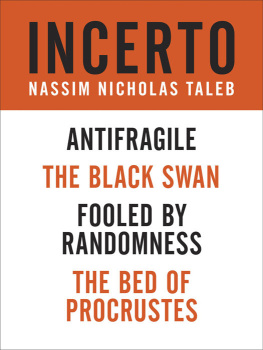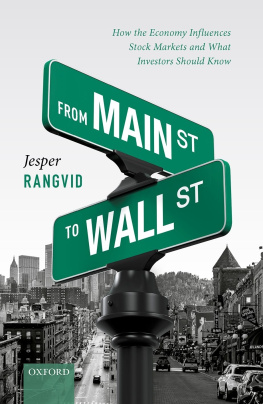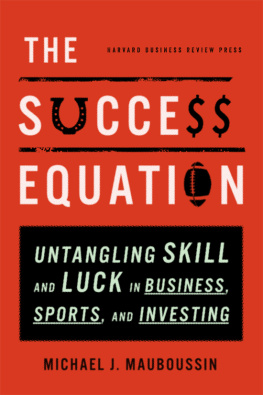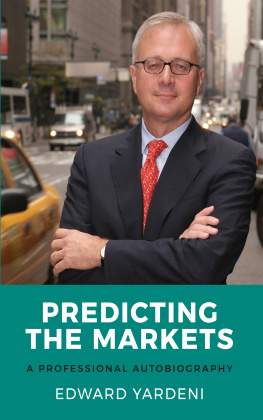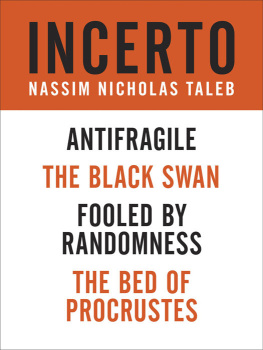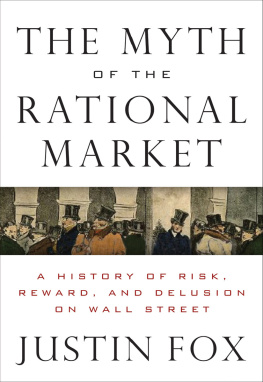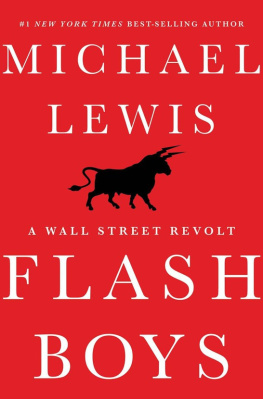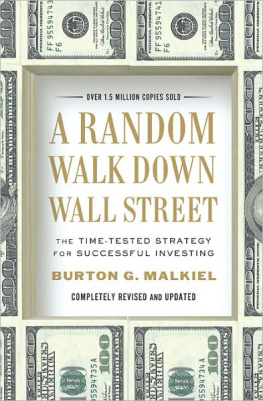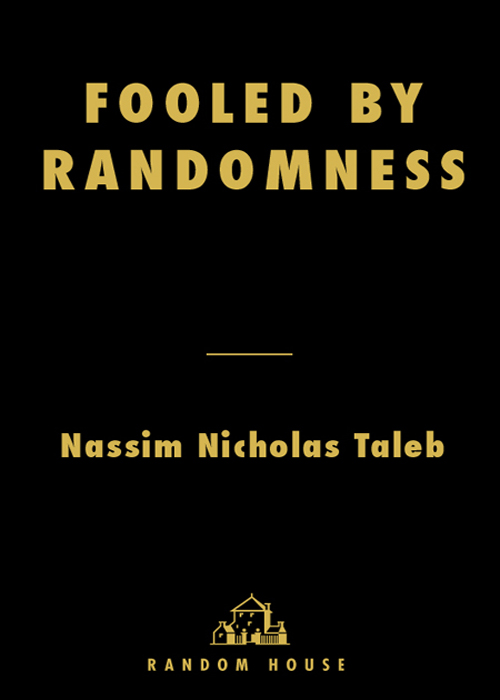
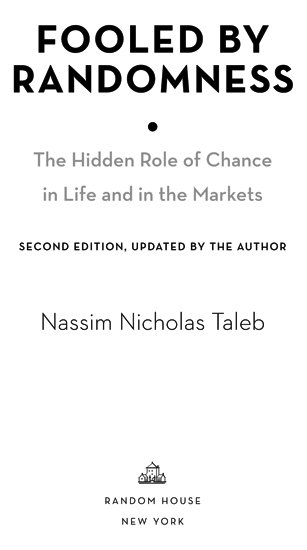
FOOLED BY
RANDOMNESS
CONTENTS
To my mother,
Minerva Ghosn Taleb
PREFACE
TAKING KNOWLEDGE
LESS SERIOUSLY
T his book is the synthesis of, on one hand, the no-nonsense practitioner of uncertainty whospen this professional life trying to resist being fooled by randomness and trick the emotions associated with probabilistic outcomes and, on the other, the aesthetically obsessed, literature-loving human being willing to be fooled by any form of nonsense that is polished, refined, original, and tasteful. I am not capable of avoiding being the fool of randomness; what I can do is confine it to where it brings some aesthetic gratification.
This comes straight from the gut; it is a personal essay primarily discussing its authors thoughts, struggles, and observations connected to the practice of risk taking, not exactly a treatise, and certainly, god forbid, not a piece of scientific reporting. It was written for fun and it aims to be read (principally) for, and with, pleasure. Much has been written about our biases (acquired or genetic) in dealing with randomness over the past decade. The rules while writing the first edition of this book had been to avoid discussing (a) anything that I did not either personally witness on the topic or develop independently, and (b) anything that I have not distilled well enough to be able to write on the subject with only the slightest effort. Everything that remotely felt like work was out. I had to purge from the text passages that seemed to come from a visit to the library, including the scientific name dropping. I tried to use no quote that did not naturally spring from my memory and did not come from a writer whom I had intimately frequented over the years (I detest the practice of random use of borrowed wisdommuch on that later). Aut tace aut loquere meliora silencio (only when the words outperform silence).
These rules remain intact. But sometimes life requires compromises: Under pressure from friends and readers I have added to the present edition a series of nonintrusive endnotes referring to the related literature. I have also added new material to most chapters, most notably in , which altogether has resulted in an expansion of the book by more than a third.
Adding to the Winner
I hope to make this book organicby, to use traders lingo, adding to the winnerand let it reflect my personal evolution instead of holding on to these new ideas and putting them into a new book altogether. Strangely, I gave considerably more thought to some sections of this book after the publication than I had before, particularly in two separate areas: (a) the mechanisms by which our brain sees the world as less, far less, random that it actually is, and (b) the fat tails, that wild brand of uncertainty that causes large deviations (rare events explain more and more of the world we live in, but at the same time remain as counterintuitive to us as they were to our ancestors). The second version of this book reflects this authors drift into becoming a little less of a student of uncertainty (we can learn so little about randomness) and more of a researcher into how people are fooled by it.
Another phenomenon: the transformation of the author by his own book. As I increasingly started living this book after the initial composition, I found luck in the most unexpected of places. It is as if there were two planets: the one in which we actually live and the one, considerably more deterministic, on which people are convinced we live. It is as simple as that: Past events will always look less random than they were (it is called the hindsight bias). I would listen to someones discussion of his own past realizing that much of what he was saying was just backfit explanations concocted ex post by his deluded mind. This became at times unbearable: I could feel myself looking at people in the social sciences (particularly conventional economics) and the investment world as if they were deranged subjects. Living in the real world may be painful particularly if one finds statements more informative about the people making them than the intended message: I picked up Newsweek this morning at the dentists office and read a journalists discussion of a prominent business figure, particularly his ability in timing moves and realized how I was making a list of the biases in the journalists mind rather than getting the intended information in the article itself, which I could not possibly take seriously. (Why dont most journalists end up figuring out that they know much less than they think they know? Scientists investigated half a century ago the phenomena of experts not learning about their past failings. You can mispredict everything for all your life yet think that you will get it right next time.)
Insecurity and Probability
I believe that the principal asset I need to protect and cultivate is my deep-seated intellectual insecurity. My motto is my principal activity is to tease those who take themselves and the quality of their knowledge too seriously. Cultivating such insecurity in place of intellectual confidence may be a strange aimand one that is not easy to implement. To do so we need to purge our minds of the recent tradition of intellectual certainties. A reader turned pen pal made me rediscover the sixteenth-century French essayist and professional introspector Montaigne. I got sucked into the implications of the difference between Montaigne and Descartesand how we strayed by following the latters quest for certitudes. We surely closed our minds by following Descartes model of formal thinking rather than Montaignes brand of vague and informal (but critical) judgment. Half a millennium later the severely introspecting and insecure Montaigne stands tall as a role model for the modern thinker. In addition, the man had exceptional courage: It certainly takes bravery to remain skeptical; it takes inordinate courage to introspect, to confront oneself, to accept ones limitationsscientists are seeing more and more evidence that we are specifically designed by mother nature to fool ourselves.
There are many intellectual approaches to probability and riskprobability means slightly different things to people in different disciplines. In this book it is tenaciously qualitative and literary as opposed to quantitative and scientific (which explains the warnings against economists and finance professors as they tend to firmly believe that they know something, and something useful at that). It is presented as flowing from Humes Problem of Induction (or Aristotles inference to the general) as opposed to the paradigm of the gambling literature. In this book probability is principally a branch of applied skepticism, not an engineering discipline (in spite of all the self-important mathematical treatment of the subject matter, problems related to the calculus of probability rarely merit to transcend the footnote).
How? Probability is not a mere computation of odds on the dice or more complicated variants; it is the acceptance of the lack of certainty in our knowledge and the development of methods for dealing with our ignorance. Outside of textbooks and casinos, probability almost never presents itself as a mathematical problem or a brain teaser. Mother nature does not tell you how many holes there are on the roulette table, nor does she deliver problems in a textbook way (in the real world one has to guess the problem more than the solution). In this book, considering that alternative outcomes could have taken place, that the world could have been different, is the core of probabilistic thinking. As a matter of fact, I spent all my career attacking the
Next page

